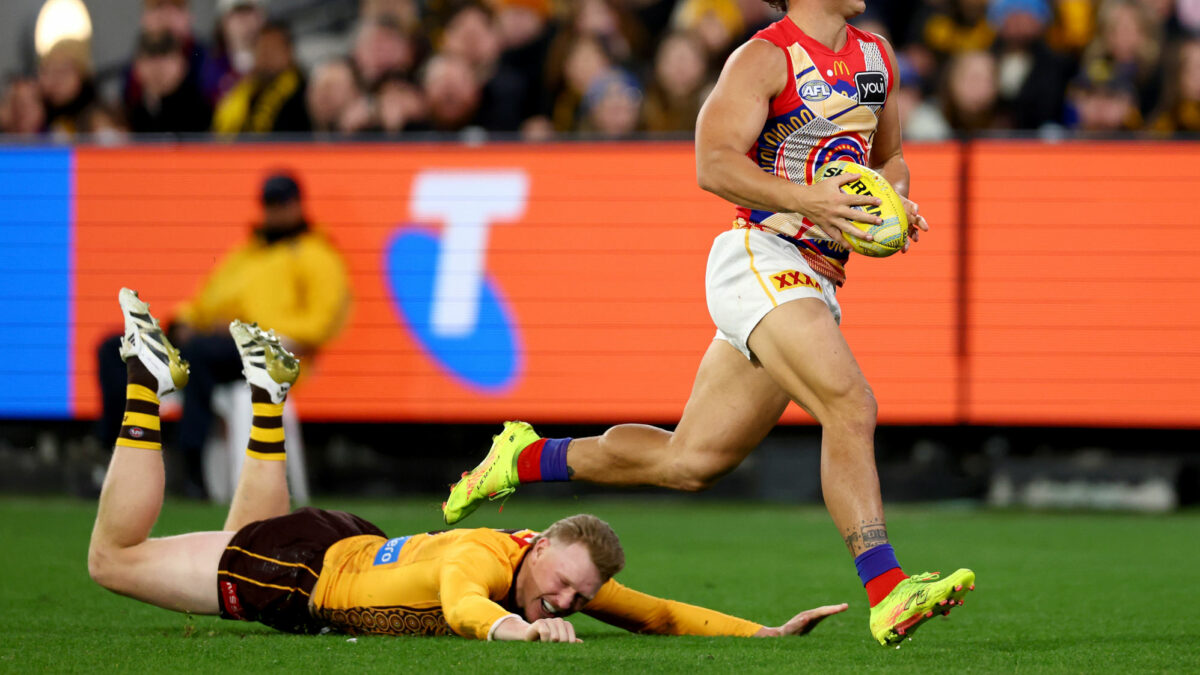With both Hawthorn and Brisbane heading into Round 11 entrenched in the top four but with notably patchy recent form behind them, Saturday’s blockbuster at the MCG was always going to be a fascinating litmus test … and lead to some serious questions for the loser.
The result? An emphatic confirmation that the Lions remain in the very top tier of contenders to defend their crown in 2025; and, as will perhaps be the main talking point out of the match, that the Hawks have problems.
They’re problems that have largely been masked by a strong 7-3 start to the season, with unconvincing wins banked against weaker oppositon and dogged fights in defeat against the few teams that have their measure.
But a team that steamrolled just about everyone they came up against in the back half of 2024, and headed into 2025 among the premiership favourites having added Tom Barrass and Josh Battle to address their one major weakness, height in defence, is now growing stagnant. Unsure with ball in hand. Undisciplined without it.
Sam Mitchell knows it better than anyone – the look of frustration on his face whenever Fox Footy’s cameras switched to him, on one occasion reacting to a Hawks mistake by punching a KFC sign behind him in a positively Alastair Clarkson-esque moment, told of a coach who was hoping for, and expects, better from his charges.
Speaking post-match, it was the midfield battle front of mind for Mitchell, having seen the Hawks cop a 41-24 clearance drubbing, 14-7 from centre clearances – and off the back of losing the count 35-50 in their loss to Gold Coast, and even 27-38 in victory over Melbourne a fortnight ago.

Cam Rayner leaves James Sicily in his wake. (Photo by Josh Chadwick/AFL Photos/via Getty Images)
There’s something afoot there – not least because the Hawks have leaked like a sieve in conceding scores from stoppages against the Suns and Lions. The Suns kicked eight goals from them in Darwin, while the Lions had a five goal to one advantage in that regard at the MCG.
The return of Conor Nash, the Hawks’ most defensively minded midfielder, from suspension to take on Brisbane certainly didn’t stiffen them up – in fact, it actually made their transition clunkier and less capable of stopping the Lions from chaining up to exit stoppages and head forward full of menace.
The Lions had 40 first possessions from clearances on Saturday; the Hawks, 31. Yet the Lions were able to translate that to a clearance 80 per cent of the time, while the Hawks could only muster a 61.3 per cent success rate.
It’s the difference between getting your hands on the ball and being able to do something effectively with it, rather than losing possession straight away or having another stoppage be forced: and it’s something the Hawks are deceptively bad at.
Here’s a fun fact: the Hawks are the third-worst clearance team per game this year: only West Coast and Richmond have a worse differential than their -4.4 relative to their opponents in 2025. That’s horrendous company for a premiership contender to find themselves in, and a far cry from last year, when they were sixth-best in that regard.
Combine that with equally poor pressure metrics – Hawthorn are the fifth-worst team in the AFL this year on tackle differential and per-game pressure acts – and it’s a recipe for disaster against a team like Brisbane that can punish so severely from stoppage, where they stand out from the pack the most.
Against weaker teams, the Hakws can get away with that, mostly because their intercepting game, thanks largely to the excellence of their talls Barrass, Battle and yes, James Sicily, is in good order.
They neutralise contests, win the ball back, and with the brilliant kicking skills of Karl Amon or Massimo D’Ambrosio or many others, work the ball from end to end and into a forward line with acres of space for Jack Gunston and the smalls to weave their magic.
But it’s a ploy made to be exploited by the Lions’ band of dangerous small forwards and lethal midfield – and indeed, most good teams can and have made the Hawks pay.
Hawthorn’s bigger problem against the Lions, though, was their own inefficiency – specifically in their kicking forward.
More than anything else, it’s pure skill which has surged the Hawks up the ladder in recent years – beautiful kicking to surge the ball from one end of the ground to another, find targets inside 50, and finish with style.
The Hawks actually had 53 per cent of the play in their own half on Saturday, regularly trapping the ball in their attacking half and only losing the inside 50 count by two: yet they mustered just eight goals.
A lot of this was down to poor use inside 50: long, high balls are exactly the sort of thing you can’t afford to do without a proper key target in there (it’s what Brisbane as a rule avoid doing, for instance), and Jack Payne in particular was a dominant force in the air because of this sloppiness.
It was a Josh Weddle error, wasting a brilliant run down the wing by aimlessly bombing from the 50m arc to the goalsquare for an easy intercepting mark for Payne, that saw Mitchell take his frustrations out on that KFC sign. It was far from the only example of forward 50 profligacy from them.
And yet, remarkably, the Hawks still found themselves with 16 marks inside 50: normally a number that results in a winning score. But the Lions’ strength was their ability to deny them easy shots: an expected score for the day of 69 suggests that, far from spraying kicks for goal, they were given low-percentage opportunities to convert.
Compare that to the Lions, who, when given the sniff of a chance inside 50, seldom wasted it.
In essence, that was the game for the Hawks: their defensive 50 to forward 50 percentage of 35 per cent is extremely healthy, so they had no issues moving the ball. But somewhere in that last kick inside 50, or often the kick after that, they lost the ability to score.
Then, there was discipline. Most manifest in Sicily giving up a 50m penalty and certain goal to Callum Ah Chee for dissent in the final quarter, it’s not something we’re used to seeing from a Hawks team that usually suckers the opposition into giving away soft frees, rather than giving them up themselves.
This tackle from Jai Newcombe, for instance, was horrendously executed, an obvious act of aggression and frustration at a match slipping away, and would have been a three-week stint on the sidelines had Jarrod Berry been concussed by it.
But it’s not just in giving away frees that the Hawks were undisciplined: it was in their disorganisation defensively, with Sicily again at the heart of it.
The Hawks’ strength of moving the ball from defence to attack at rapid speed is itself a high-risk endeavour: it means that both the players they value down back are not necessarily, strictly speaking, defenders, while also requiring them to have a licence to run off and create when required.
That’s my explanation, anyway, for Sicily skirting around the back of the pack around a loose ball inside 50 in the third term, hoping for a handball receive after a teammate wins the contest, and leaves him looking foolish and in utter no-man’s land when the Lions win it and the ball gets to his direct opponent, Callum Ah Chee, for a pressure-free goal.
Sicily, for the record, was far better on Saturday than in recent weeks: his intercepting was excellent, taking five intercept marks, while his disposal was vastly improved.
But his role has changed in 2025: with Barrass and Battle marking the key forwards, he often finds himself occupying players in his own weight division, but often nimbler than he is. Ah Chee at the MCG bagged four goals, most of them on him, while Sun Ben Long gave him similar trouble just last week.
Sicily has been a weapon for many years in defence because of his exceptional reading of the play: playing as a key defender, his opponents would naturally draw the ball in his direction, and the slightest error from them would lead to intercepts galore.
The smalls, though, become dangerous both on the lead and when the ball hits the ground, both areas Sicily is vulnerable in. In the above clip, for instance, had he not been preoccupied with concern around competing directly with Ah Chee, I’m willing to bet he’d have flown to try and take an intercept mark to quell the original forward foray; it’s also noticeable just how quick the Lions forward looks in relation to him, and how nimbly he changes direction at the crucial point.
Defensively disorganised. Wasteful moving forward. Cannon fodder in midfield.
That was the tale of the Hawks’ afternoon at the MCG – and with Collingwood and the Western Bulldogs in their next fortnight, two powerful stoppage teams that move the ball aggressively and have dangerous forward options both tall and small galore, there is going to need to be some serious retooling work done by Mitchell and his team to avoid a season which is still firmly on the tracks sliding into chaos.
This Hawthorn team is still good enough to turn this around, and powerful enough at their best to win the premiership if those weaknesses are neutralised.
For the first time since his team began their upward climb a little over 12 months ago, Mitchell has a challenge on his hands. His team’s response will be fascinating.






